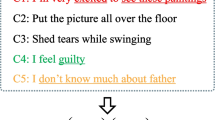Abstract
Emotion-cause pair extraction (ECPE) aims to extract all potential pairs of emotions and corresponding cause(s) from a given document. Current methods have focused on extracting possible emotion-cause pairs by directly analyzing the given documents on the basis of a large training set. However, there are many hard-matching emotion-cause pairs that require commonsense knowledge to understand. Exploiting only the given documents is insufficient to capture the latent semantics behind these hard-matching emotion-cause pairs, which may downgrade the performance of existing ECPE methods. To fill this gap, we propose a Knowledge-Enhanced Hierarchical Transformers framework for the ECPE task. Specifically, we first inject commonsense knowledge into the given documents to construct the knowledge-enhanced clauses. To incorporate the injected knowledge into the clause representations, we then develop a hierarchical Transformers module that leverages two different types of transformer blocks to encode knowledge-enriched clause representations at both global and local stages. Experimental results show that our method achieves state-of-the-art performance.
Access this chapter
Tax calculation will be finalised at checkout
Purchases are for personal use only
Similar content being viewed by others
References
Bao, Y., Ma, Q., Wei, L., Zhou, W., Hu, S.: Multi-granularity semantic aware graph model for reducing position bias in emotion cause pair extraction. In: Findings of ACL, pp. 1203–1213 (2022)
Cheng, Z., Jiang, Z., Yin, Y., Li, N., Gu, Q.: A unified target-oriented sequence-to-sequence model for emotion-cause pair extraction. IEEE/ACM Trans. Audio Speech Lang. Process. 29, 2779–2791 (2021)
Ding, Z., Xia, R., Yu, J.: ECPE-2D: emotion-cause pair extraction based on joint two-dimensional representation, interaction and prediction. In: ACL, pp. 3161–3170 (2020)
Ding, Z., Xia, R., Yu, J.: End-to-end emotion-cause pair extraction based on sliding window multi-label learning. In: EMNLP, pp. 3574–3583 (2020)
DongZ, D., HAO, C.: Hownet and the computation of meaning (2006)
Fan, C., et al.: A knowledge regularized hierarchical approach for emotion cause analysis. In: EMNLP-IJCNLP, pp. 5614–5624 (2019)
Fan, C., Yuan, C., Du, J., Gui, L., Yang, M., Xu, R.: Transition-based directed graph construction for emotion-cause pair extraction. In: ACL, pp. 3707–3717 (2020)
Gui, L., Xu, R., Wu, D., Lu, Q., Zhou, Y.: Event-driven emotion cause extraction with corpus construction. In: EMNLP, pp. 145–160. World Scientific (2018)
Huang, W., Yang, Y., Peng, Z., Xiong, L., Huang, X.: Deep neural networks based on span association prediction for emotion-cause pair extraction. Sensors 22(10), 3637 (2022)
Kingma, D.P., Ba, J.: Adam: a method for stochastic optimization. arXiv preprint arXiv:1412.6980 (2014)
Mittal, A., Vaishnav, J.T., Kaliki, A., Johns, N., Pease, W.: Emotion-cause pair extraction in customer reviews. arXiv preprint arXiv:2112.03984 (2021)
Turcan, E., Wang, S., Anubhai, R., Bhattacharjee, K., Al-Onaizan, Y., Muresan, S.: Multi-task learning and adapted knowledge models for emotion-cause extraction. arXiv preprint arXiv:2106.09790 (2021)
Vaswani, A., et al.: Attention is all you need. In: Advances in Neural Information Processing Systems, vol. 30 (2017)
Wang, F., Ding, Z., Xia, R., Li, Z., Yu, J.: Multimodal emotion-cause pair extraction in conversations. arXiv preprint arXiv:2110.08020 (2021)
Wei, P., Zhao, J., Mao, W.: Effective inter-clause modeling for end-to-end emotion-cause pair extraction. In: ACL, pp. 3171–3181 (2020)
Wu, Z., Dai, X., Xia, R.: Pairwise tagging framework for end-to-end emotion-cause pair extraction. Front. Comp. Sci. 17(2), 1–10 (2023)
Xia, R., Ding, Z.: Emotion-cause pair extraction: a new task to emotion analysis in texts. In: ACL, pp. 1003–1012 (2019)
Yan, H., Gui, L., Pergola, G., He, Y.: Position bias mitigation: a knowledge-aware graph model for emotion cause extraction. arXiv preprint arXiv:2106.03518 (2021)
Yang, C., Zhang, Z., Ding, J., Zheng, W., Jing, Z., Li, Y.: A multi-granularity network for emotion-cause pair extraction via matrix capsule. In: CIKM, pp. 4625–4629 (2022)
Yuan, C., Fan, C., Bao, J., Xu, R.: Emotion-cause pair extraction as sequence labeling based on a novel tagging scheme. In: EMNLP, pp. 3568–3573 (2020)
Acknowledgements
This work is supported by the National Key Research and Development Program of China (under grant 2020AAA0106100).
Author information
Authors and Affiliations
Corresponding author
Editor information
Editors and Affiliations
Rights and permissions
Copyright information
© 2023 The Author(s), under exclusive license to Springer Nature Switzerland AG
About this paper
Cite this paper
Wang, Y., Li, Y., Yu, K., Hu, Y. (2023). Knowledge-Enhanced Hierarchical Transformers for Emotion-Cause Pair Extraction. In: Kashima, H., Ide, T., Peng, WC. (eds) Advances in Knowledge Discovery and Data Mining. PAKDD 2023. Lecture Notes in Computer Science(), vol 13938. Springer, Cham. https://doi.org/10.1007/978-3-031-33383-5_9
Download citation
DOI: https://doi.org/10.1007/978-3-031-33383-5_9
Published:
Publisher Name: Springer, Cham
Print ISBN: 978-3-031-33382-8
Online ISBN: 978-3-031-33383-5
eBook Packages: Computer ScienceComputer Science (R0)




